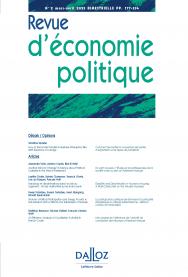
| Auteur(s) |
Alexandre Volle Bilal El Rafhi Antoine Cazals |
| Type de publication | Article |
| Référence | Revue d'économie politique 2023/2 (Vol. 133), pages 203 à 231 |
Some citizens who are dissatisfied with long-established politicians are turning to new representatives, that come from the general public, referred to as political outsiders. This article empirically explores whether the change in political representatives –achieved by citizens voting for political outsiders– leads to a change in political representation. Our analysis uses original data on the votes and activity of over 1,000 members of the French Parliament (MPs) between 2012 and 2020. Isolating an outsider effect remains a challenge as they are both novices in politics and in the Parliament. Our empirical strategy allows disentangling the political experience effect from the parliamentary experience effect using novice MPs political insiders. First, we find that political outsiders are more independent than political insiders only in low disciplined political groups, and there is no evidence concerning highly disciplined political groups. Second, using a non-parametric multidimensional index measuring MPs’ legislative activity, our findings indicate that parliamentary inexperience explains why newly elected MPs are less productive at first and then catch up with their experienced counterparts within a year after taking office. However, over the entire legislature, the difference between new and re-elected MPs level of activity does not appear to be significant. Overall, even if the election of political outsiders allows changes in some usual individual characteristics of the representatives as age or gender, it appears that more conditions are needed than solely electing political outsiders to change the manner of doing politics.























